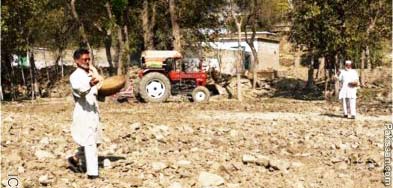Status quo approach in agri
development
By
Ahmad Fraz Khan
 June
06, 2011: IF the Pakistan Muslim League-Nawaz wants
self-reliance, doing away with foreign aid and loans, it is
natural for everyone to expect its next budget in Punjab —
where the party rules — to reflect that commitment.
June
06, 2011: IF the Pakistan Muslim League-Nawaz wants
self-reliance, doing away with foreign aid and loans, it is
natural for everyone to expect its next budget in Punjab —
where the party rules — to reflect that commitment.
However, news emanating from the provincial finance
department is hardly encouraging, at least from
self-reliance perspective. It would be more of a status quo
budget. According to its finance department officials, out
of an stipulated Rs184 billion development budget, the
agriculture sector would get Rs2 billion, livestock Rs1.5
billion and irrigation Rs11.8 billion.
The total allocation for the entire sector would thus be
just over Rs15 billion – eight per cent of the development
budget. There is no big project; all the money will be spent
on some minor water efficiency projects, which are already
under way and needed cash to get completed.
To make the matter worse, the finance department is warning
all others to expect cuts on their development allocations
as well later on. According to them, the Punjab government
would make healthy allocations to keep the budget
politically viable. But, drastic cuts, as it applied this
year, are a distinct possibility because of likely
overspendings on non-development, like huge subsidy
packages.
The farmer bodies and agriculture business houses were
expecting some revolutionary steps, especially after the
PML-N raising the slogan of self-reliance. This requires
huge investment in agriculture. All of them agree that if
anyone — federation or Punjab — wants to go for
self-reliance, the only sector that can ensure it in short
and long-term is agriculture, including its sub-sectors like
livestock and horticulture.
Punjab, they maintain, is nothing but agriculture. How one
can expect self-reliance with agriculture stagnated (with
little development spending), where it has been for the last
many years, they wonder.
They believe that if Punjab has to opt for self-reliance,
and lead the country in the same direction, it has to
revolutionise its agriculture. As a first step, it must
start concentrating on per acre yield, rather than just take
consolation in total production figures of any crop. It is
time to increase per acre yield, and spare land for other
high-value crops.
The Chinese model can be replicated here, which has set a
target of 100 maunds per acre production target for every
crop, be it wheat, rice or cotton. If Pakistan cannot
leapfrog its targets to the Chinese level in one go, it must
start journey on that route.
To begin with, there is no reason why it cannot increase its
wheat production from current average of 28 maunds to 40 or
45 maunds per acre. There are some farmers who are producing
75 to 80 maunds per acre. If wheat average jumps by 30 per
cent, it means that 30 per cent land could be spared for
other crops or 30 per cent surplus could be exported every
year.
Similarly, cotton is another option that can shore up the
economy. There are some farms, run by private seed
companies, where per acre yield has gone up to 80 maunds per
acre. These farms exist in Punjab, with demonstrable
technology and practices. Why the Punjab government cannot
get a clue from them and spread the technology and practices
to other areas.
The only thing it needs is money, which should come in the
form of budgetary allocation and official commitments. At
present, its per acre yield is stuck at 19 maunds per acre.
If Punjab adds five million bales in its production, it
would ge direct and indirect benefit of over $5 billion.
This is achievable.
Scientists believe that Pakistan can raise its production to
20 million bales within a span of two to three years with
right kind of practices, provided it spares money and
manpower for the purpose.
If Pakistan can deal successfully with five major crops –
wheat, rice, cotton, cane and maize – it would be jumping to
self-reliance within a span of few years. All these targets
are achievable because the world has already done it and a
few farmers in Pakistan are doing it. Unfortunately, no such
initiative seems to be part of the provincial budget.
On one hand, Punjab needs to concentrate on per acre yield,
and on the other, it must find market abroad for the
produce. The big business houses believe that if Punjab
achieves a certain level of production and has a sustainable
surplus, the private sector itself would find foreign
markets. The problem is sustainable production, they insist.
In order to make its exports more profitable, Punjab must
invest in value addition. There is hardly 15 per cent value
addition in the country against over 50 per cent in India
and 80 per cent in developed world. That is where the
province needs to invest rather than going after politically
driven sasti roti (low priced bread) and subsidy packages.
Had Punjab invested around Rs35 billion, which it lost to
unspecified subsidies last year, in value addition, it could
have made a difference in the life of people. But it did
not, and it is still not ready to do it if the next
budgetary allocations are something to go by.
If Punjab can somehow add one litter of milk to its
production, which is a matter of simple management practice
of which the farmers are aware, it can add Rs22 billion to
the rural economy. It shows the magnitude of huge potential
in the sector which remains untapped because of paucity of
money, technology and political commitment.
Budget is the time to show it, but the PML-N government in
Punjab seems to be failing in that despite political
sloganeering to the contrary.